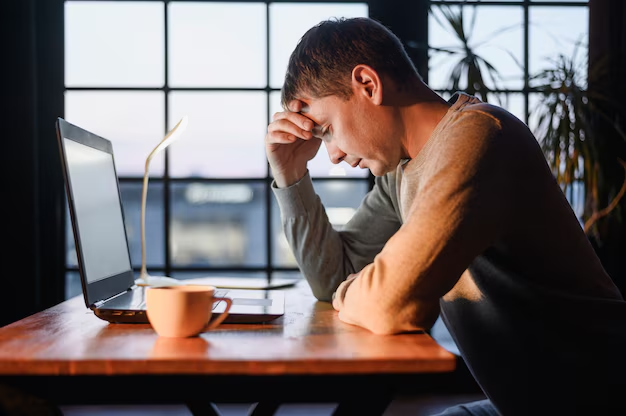Can Anxiety Really Make You Feel Exhausted? Understanding the Connection Between Anxiety and Fatigue
Imagine waking up feeling like you haven't slept a single wink, even though technically you had a full night's rest. For some, this exhausting feeling is not due to a lack of sleep but rather, the pervasive weight of anxiety. Can anxiety cause fatigue? This is a question many are asking as they struggle with tiredness that seems unbefitting of their lifestyle. Let's delve into how anxiety could potentially be draining your energy and what this means for your daily life.
Understanding Anxiety and How It Affects You
What Is Anxiety?
Anxiety is more than just feeling stressed or worried occasionally. It's a persistent feeling of apprehension, fear, or worry that is hard to control. While stress is a natural response to perceived threats, anxiety can remain when the stressor itself is long gone. Chronic anxiety can significantly impact a person’s physical and mental health, hence causing concerns like fatigue.
The Anxiety-Fatigue Link
How does anxiety drain energy? When you're anxious, your body is in a constant state of 'fight-or-flight.' This reaction is controlled by your autonomic nervous system, specifically by two elements: the sympathetic nervous system (which amps you up) and the parasympathetic nervous system (which calms you down). If you're continually anxious, your body is persistently being primed for action, which can deplete your energy reserves, leading to fatigue.
Signs and Symptoms of Anxiety-Related Fatigue
How Does It Manifest?
Anxiety-related fatigue can manifest in numerous ways. The symptoms might include:
- Physical exhaustion: Feeling tired even after adequate sleep, possibly with muscle weakness or slowed reflexes.
- Mental fatigue: Having trouble concentrating, feeling 'foggy,' or experiencing a general lack of mental sharpness.
- Emotional exhaustion: Feeling overwhelmed, impatient, or irritable, alongside the constant worry that anxiety brings.
Long-Term Impact
Prolonged anxiety-induced fatigue doesn't just affect your ability to perform daily tasks. Over time, it can increase your vulnerability to physical illnesses, reduce your ability to cope with stress, and significantly impair your quality of life. Recognizing and addressing these symptoms early can prevent potential long-term health consequences.
The Role of Sleep in Anxiety and Fatigue
Anxiety's Toll on Sleep
Anxiety can seriously disrupt sleep patterns. For many, this manifests as insomnia, trouble staying asleep, or waking up too early and not being able to go back to sleep. The racing thoughts associated with anxiety interfere with the ability to relax enough to get a good night's rest, creating a vicious cycle where lack of sleep intensifies anxiety which in turn exacerbates fatigue.
Sleep Hygiene Tips
Although challenging, improving sleep hygiene can aid those dealing with anxiety-related fatigue. Consider implementing these tips:
- Establish a routine - Go to bed and wake up at the same time daily, even on weekends.
- Limit screen time - Avoid electronic devices at least an hour before bedtime.
- Create a restful environment - Keep the room dark, cool, and quiet.
- Use relaxation techniques - Practice deep breathing, meditation, or gentle yoga before bed.
By addressing the sleep disturbances commonly associated with anxiety, you can mitigate some of the fatigue that you experience.
Coping with Anxiety-Induced Fatigue
Practical Strategies
While alleviating anxiety-induced fatigue often requires addressing the root cause (anxiety itself), there are practical strategies that can help manage fatigue:
- Stay active: Regular, moderate exercise is proven to improve mood and reduce anxiety. Physical movement releases endorphins and can help tire your body in a healthy way.
- Balanced nutrition: Eating a well-rounded diet can stabilize your mood and energy levels. Include foods rich in omega-3 fatty acids, whole grains, and plenty of fruits and vegetables.
- Mindful relaxation: Practicing mindfulness techniques can help manage anxiety and fatigue. Techniques such as guided meditation or mindfulness-based stress reduction (MBSR) can provide relief.
Professional Help
Sometimes, tackling anxiety and its effects requires professional guidance. Cognitive Behavioral Therapy (CBT) is a highly effective treatment for anxiety, helping people change thinking patterns to better manage stress and anxiety-related fatigue. Speaking with a mental health professional can also offer personalized strategies tailored to your unique situation.
Empowering Yourself with Knowledge and Resources
Staying Informed
Understanding the mechanisms of anxiety and the ways it affects your health is empowering. Continued learning about stress management, anxiety disorders, and self-care strategies is crucial.
Support Networks
Connecting with others who share similar experiences can provide support and encouragement. Online forums, support groups, or community activities are great places to start. Not only can this reduce feelings of isolation, but it also opens up a dialogue for shared coping strategies.
Setting Realistic Expectations
One of the hardest parts of managing anxiety-induced fatigue is setting realistic expectations for yourself. This means acknowledging your limitations and not punishing yourself for them. Prioritize tasks and recognize that sometimes it's okay to say no or ask for help.
Reflecting on the Path Forward
Anxiety is a challenging condition, and its impact on your energy levels is both real and significant. Understanding that anxiety can be a source of fatigue is a step towards better management strategies. With practical adjustments and professional guidance, it's possible to improve both mental health and energy levels, allowing you to live a more vibrant and fulfilling life.
Key Takeaways 📝
- Anxiety can cause fatigue due to its impact on the body's stress response.
- Symptoms of anxiety-induced fatigue include physical, mental, and emotional exhaustion.
- Sleep disruptions are common with anxiety, necessitating good sleep hygiene.
- Managing fatigue involves exercise, nutrition, and relaxation techniques.
- Professional guidance and support networks can provide additional strategies.
Remember, fatigue and anxiety can be managed with the right approach and support, ensuring that you move towards a healthier, balanced lifestyle. 🌟

